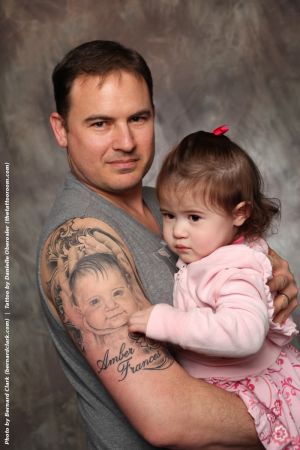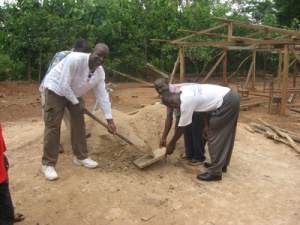Deletedpage
Christian Bryant
|
Introduction
My name is Christian Bryant, OLPC Support volunteer #262, and my place on the olpcMap is Southern California. I am a computer technologist with experience executing technical, managerial and consultative work in support of information technology services and activities. From providing customer support and assistance with complex work and troubleshooting for hardware and software problems, to overseeing and participating in feasibility studies of technology direction and providing recommendations, I have performed under general supervision and as a self-managed leader and technology evangelist.
I am also a GNU/Linux engineer specializing in software configuration management and project management for collaborative, distributed GNU technologies. Additionally, I create customized GNU/Linux implementations demonstrating minimal, development-oriented packages with inherent configuration management. I work only with free software on these projects and future plans include replacing my GNU/Linux builds with GNU/Hurd once that kernel is mature, and writing an interface to provide custom GNU/Hurd build tools for software configuration managers interested in creating secure, configuration-managed servers for free software development teams.
While I am essentially a Free/Libre and Open Source Software (FLOSS) technology hobbyist, I do also have an interest in philanthropy and non-profit organizations. Because much of the software I use in my work is GNU and associated with the Free Software Foundation (FSF) and the Linux Foundation, I have taken up work with a local non-profit to learn more about how GNU/FSF and Linux can most benefit philanthropic causes. Over the course of my career, I hope to learn more about how philanthropic organizations work, and eventually form my own non-profit organization to meet the needs of a community under stress using humanitarian FLOSS.
To learn more about the non-profit I currently work with as a GNU/FSF and Linux resource, you can visit their website here:
- Sampa Community Educational Project - http://myscep.org
One Laptop Per Child
As a Support Group volunteer for OLPC, my current responsibilities include:
- Contribute to improvement of curation and maintenance of documentation and other digital OLPC artifacts.
- Participate in Contributor Program proposal reviews.
- Mentoring new project contributors.
- Member of the OLPC Support Gang, helping other users.
- Local support for the Southern California OLPC team.
- Volunteer for OLPC booths at events such as SCALE 9x.
Current Projects
Humanitarian Aid in Ecuador
I am acting as mentor for a newly approved project in Ecuador that seeks to create a UV water sterilization lamp that attaches to a USB on the OLPC XO and will last long enough to sterilize several liters of water on one battery charge. More details of the project to come as it is fleshed out, but for an understanding of why projects like this are important, see the XOs for Humanitarian Aid / Disaster Relief page.
Education in Ghana
A Roman Catholic, I have a commitment to service, and am proud to support one of the ministries that has emerged from my parish in Los Angeles, Sampa Community Educational Project through my fellow Catholic, Thaddeus Mensah. From building and repairing schools in Ghana to distributing donated textbooks, SCEP personifies the goals of organizations like OLPC. As one of my projects this year I plan on getting SCEP more involved with OLPC and helping in particular the area of Sampa, Ghana, benefit from this key educational resource.
In 2006, Professor Rashid Dorsey gave 35 used CPU computers as a donation to various schools in Sampa, Ghana, West Africa. The computers were packaged, shipped and transported to the rural community for distribution. Thaddeus Mensah spearheaded this project. Matthew Essieh, Entrepreneur and business owner was instrumental with the project. Matthew provided financial assistance to purchase keyboards, mouse and monitors for the CPUs as well as covered the shipping and customs costs. Now in 2011, we hope to bring this technology to a whole new level through OLPC. As prior OLPC activities in Ghana have shown, there is a great need and the reception by Ghana has been positive.
See the OLPC Talk page for Ghana for more stories and the main OLPC Ghana page for more information.
OLPC Philippines
Another project I hope to get involved in over the coming years is OLPC Philippines. It's close to heart because my wife is Filipino and the process of bringing her family here over the years was pretty emotional. Since my daughter is Pinay by blood, I want her to know her roots and give back to her side of the family, helping provide opportunities some of her relatives didn't and don't have.
Public Keys
I regularly sign and encrypt emails and files, generally source code and other development related configuration items. If you wish to read signed and encrypted emails from me, or confirm that development files are from my development environment, you may do so by using my GPG /public key or SSH /key.
IRC
I can often be found on several channels in Freenode. The best way to get in contact with me is to engage me in conversation on a topic of interest to me. These are the channels I most often join, under the nickname ``christianabryant:
- #olpc - Contact point for all things olpc, and the core hardware development team's own channel.
- #olpc-help - Community help. If you need help using your XO, and you haven't asked anywhere else: try here first.
- #olpc-support-gang - The Support Gang is a group of worldwide volunteers that help other users.
- #sugar-newbies - If you're starting to develop in Sugar, you can ask here and help contribute to the new developers manual and FAQ.
- #sugar - Sugar development.
- #fedora-olpc - The home of the Fedora interest group for OLPC.
- #gnu - The official GNU Project Channel.
- #fsf - Discussion about the FSF (Free Software Foundation) and fsf.org.
- #libreplanet - Discussion of the LibrePlanet website, and conference.
- #emacs - Discussion regarding Emacs.
- #hurd - Discussion regarding Hurd.
- #savannah - Savannah.GNU.org hangout channel.
- #gnu-webmasters - The GNU Webmasters channel, for discussions about www.gnu.org.
- #guile - The Guile channel about the GNU Scheme interpreter.
- #lisp - The Lisp channel, regarding the programming language.
- #scheme - The Scheme channel, a dialect of Lisp.
- #flossmanuals - Discussion about free manuals for free software and flossmanuals.net.
GNU/Linux Software
While I use many FLOSS applications from day-to-day in my working environment, particularly when working with the Sugar Learning Platform, the applications I tend to use the most on a technical level are listed below in alphabetical order. Indicative of my focus as a GNU/Linux engineer, they are the core tools used to write, build, debug, test and release GNU software packages and a custom GNU/Linux OS. As a regular user of many GNU/Linux distributions, any additional software I use in my daily activities is likely to be part of a standard KDE or GNOME desktop release on any major GNU/Linux distribution. Sugar under Fedora is my default desktop environment for OLPC troubleshooting, development and experimentation. I also use the Sugar Creation Kit.
GNU Software
- Autoconf
- Autogen
- Automake
- Bash
- Bazaar
- Binutils
- Bison
- Coreutils
- DejaGnu
- Diffutils
- GNATS
- GNOME
- Emacs
- Findutils
- Gawk
- GCC
- Glibc
- GRUB
- Guile
- GNU Hurd
- Libtool
- M4
- GNU Make
- Sed
- Texinfo
Linux Software
Documentation
My Memberships
The Linux Foundation
I believe in... Freedom. Innovation. Community. Technology. Openness. Education. Imagination. Collaboration. Flexibility. Neutrality. Security. Productivity. Free beer. Individuality. Advancement. LINUX.
Free Software Foundation
The Free Software Foundation (FSF) is a nonprofit with a worldwide mission to promote computer user freedom and to defend the rights of all free software users.
As our society grows more dependent on computers, the software we run is of critical importance to securing the future of a free society. Free software is about having control over the technology we use in our homes, schools and businesses, where computers work for our individual and communal benefit, not for proprietary software companies or governments who might seek to restrict and monitor us.
The Free Software Foundation is working to secure freedom for computer users by promoting the development and use of free (as in freedom) software and documentation — particularly the GNU operating system — and by campaigning against threats to computer user freedom like Digital Restrictions Management (DRM) and software patents.


